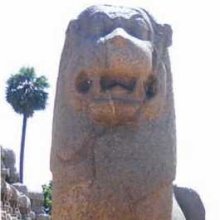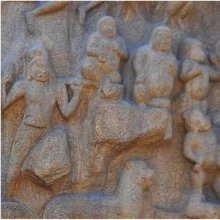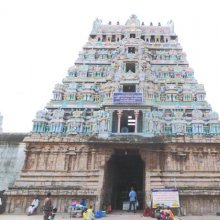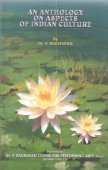Nadu, Nāḍu: 4 definitions
Introduction:
Nadu means something in the history of ancient India. If you want to know the exact meaning, history, etymology or English translation of this term then check out the descriptions on this page. Add your comment or reference to a book if you want to contribute to this summary article.
Images (photo gallery)
India history and geography
Source: Early History Of The Deccan Pts.1 To 6: Principal Administrative Divisions from the Rise of the SātavāhanasNāḍu (नाडु) refers to an “administrative designation”.—In the Kanarese areas and certain contiguous tracts we meet with the term nāḍu (e.g. Veṅgai-nāḍu).
Source: Shodhganga: A study of place names of Nalgonda districtNadu is one of the terms designating an ‘administrative division’ used in the inscriptions of Andhra Pradesh.—Its original meaning in Tamil is “the cultivated or settled area”, since nadu later on came to be designated for a large area, its expanded meaning may be “a country”. Besides, nadu was a State revenue unit. Nadu had no fixed size. It ranged from about 10 to 300 square miles. Sometimes it was as large as Renandu-7000 and at times the same was restricted to a small unit of Renandu-70.
Source: Cologne Digital Sanskrit Dictionaries: Indian Epigraphical GlossaryNāḍu.—(IE 8-4; SII 1; SITI), a country; a territorial divi- sion; a district or a subdivision; the local assembly to govern the civic affairs of the division called nāḍu. (EI 31), a chamber. Note: nāḍu is defined in the “Indian epigraphical glossary” as it can be found on ancient inscriptions commonly written in Sanskrit, Prakrit or Dravidian languages.

The history of India traces the identification of countries, villages, towns and other regions of India, as well as mythology, zoology, royal dynasties, rulers, tribes, local festivities and traditions and regional languages. Ancient India enjoyed religious freedom and encourages the path of Dharma, a concept common to Buddhism, Hinduism, and Jainism.
Languages of India and abroad
Kannada-English dictionary
Source: Alar: Kannada-English corpusNaḍu (ನಡು):—
1) [verb] to put ( a plant) into the ground; to plant.
2) [verb] to set (a pillar, stake, etc.) firmly into the ground; to fix firmly or cause to pierce into or through (usu. perpendicular to the surface).
3) [verb] (a sword, arrow, etc.) to pierce into; to penetrate into.
--- OR ---
Naḍu (ನಡು):—
1) [noun] a point equally distant from all points on the circumference of a circle or surface of a sphere; centre.
2) [noun] the approximate middle point, place or part of anything; the central region.
3) [noun] the part of the body in humans between the ribs and the hips, which is approximately the central portion.
--- OR ---
Nāḍu (ನಾಡು):—
1) [noun] the region inhabited by human beings.
2) [noun] the whole land or territory of a nation or state; a state or country.
3) [noun] the rural area of a country; up-country.
4) [noun] an area of land; region.
5) [noun] an administrative division of a state a district.
6) [noun] the body of people, and the system of, governing a state; government.
7) [noun] common people (of a country).
8) [noun] ನಾಡ ಕಥೆ [nada kathe] nāḍa kathe a story handed down for generations among a people whose historicity is not verifiable; a legend; ನಾಡಕರಣಿ [nadakarani] nāḍa karaṇi the leader of a people. 2. a family name used in Karnāṭaka and Mahārāṣṭra; ನಾಡ ಖೋಡಿ [nada khodi] nāḍa khōḍi a villain who is notoriously known all over the region; ನಾಡ ಗಾದೆ [nada gade] nāḍa gāde a widely-known, short popular saying, usu. of unknown and ancient origin, that expresses effectively some commonplace truth or useful thought; an adage; a proverb; ನಾಡ ಗೀತೆ [nada gite] nāḍa gīte a song of praise or devotion to a nation, state or region; an anthem; 2. the official song of a state, region or nation; ನಾಡ ಗೌಡ [nada gauda] nāḍa gauḍa the chief of a region, state; ನಾಡ ಚಲ್ಲವತ್ತ [nada callavatta] nāḍa callavatta a man who breaks faith with or fails to meet the confidence placed on him; a betrayer; ನಾಡ ಜನ [nada jana] nāḍa jana the common people of a state or nation; ನಾಡ ದೇವಿ [nada devi] nāḍa dēvi the presiding female deity of a country or state; 2. Bhuvanēśvari, the presiding Goddess of Karnāṭaka; ನಾಡ ದೈವ [nada daiva] nāḍa daiva the presiding deity of a country or state; 2. any petty god; ನಾಡ ದಡ್ಡಿ [nada daddi] nāḍa daḍḍi a stupid woman; ನಾಡ ನುಡಿ [nada nudi] nāḍa nuḍi = ನಾಡ ಗಾದೆ [nada gade]; 2. the main language of a state or country; 3. indecent, abusive language or speech; ನಾಡ ಮದ್ದು [nada maddu] nāḍa maddu any medicine made from the traditional knowledge handed over from generation to generation, esp. without using chemical substances; ನಾಡ ಮಾತು [nada matu] nāḍa mātu = ನಾಡ ಗಾದೆ [nada gade]; 2. news relating to a state, general public, etc.; 2.3. general and casual talking; ನಾಡ ಮುಖ [nada mukha] nāḍa mukha a leader of the people of a country or state; ನಾಡ ವಾರ್ತೆ [nada varte] nāḍa vārte news relating to a state, general public, etc.; 2. general or casual talking; ನಾಡ ಹಬ್ಬ [nada habba] nāḍa habba the state festival of a state-country, observed by people of all religions, creed, etc.; ನಾಡ ಹಾಡು [nada hadu] nāḍa hāḍu = ನಾಡ ಗೀತೆ [nada gite]; ನಾಡ ಹಾದಿ [nada hadi] nāḍa hādi a path or road of imperfect construction; ನಾಡ ಹುಚ್ಚ [nada hucca] nāḍa hucca an absolutely foolish man; ನಾಡ ಹುಚ್ಚಿ [nada hucci] nāḍa hucci an absolutely foolish woman; ನಾಡ ಬೀಡುಗ [nada biduga] nāḍa bīḍuga a common man.
--- OR ---
Nādu (ನಾದು):—
1) [verb] to mix and work (dough, clay, etc.) into a pliable mass by folding over, pressing, and squeezing.
2) [verb] to hit repeatedly with a hard, heavy blows or impact.
--- OR ---
Nādu (ನಾದು):—
1) [verb] to place or keep in liquid in order to saturate thoroughly; to soak.
2) [verb] to wet thoroughly; to saturate or drench.
3) [verb] to become wet or drenched.
4) [verb] to become liquid; to be liquefied; to melt.
5) [verb] to soften; to make gentle and tender.
--- OR ---
Nādu (ನಾದು):—[noun] an excessive interest in or enthusiasm for some one thing; craze; monomania.
Kannada is a Dravidian language (as opposed to the Indo-European language family) mainly spoken in the southwestern region of India.
See also (Relevant definitions)
Starts with (+170): Nadu badami, Nadu murukana balli, Nadu-gauda, Nadu-kaval, Nadu-talaiyarikkam, Naduakrotu, Nadubadami, Nadubanu, Naduberalu, Nadubettu, Nadubidu, Nadubottu, Nadudale, Nadudara, Nadudari, Naduga, Nadugadde, Nadugadu, Nadugala, Nadugamti.
Ends with (+136): Akanatu, Anadu, Anatu, Annadu, Annanatu, Antanatu, Ariyanatu, Aruvanatu, Asalasanadu, Asalusanadu, Asinadu, Atittu-mutalanatu, Badaganadu, Bainadu, Bardilanadu, Bayalnadu, Bayalunadu, Calinadu, Cannatu, Cen-tamilnatu.
Full-text (+1726): Nadu-kaval, Kottam, Kanjamalai, Kancipura, Tamila, Nadu-talaiyarikkam, Posagannada, Naduvaha, Karevettu, Nadu-gauda, Marunal, Kal-nadu, Maha-nadu, Mer-padi-kaval, Nattupati, Karbettu, Kumbhakona, Karvettu, Citai, Caulika.
Relevant text
Search found 41 books and stories containing Nadu, Nāḍu, Naḍu, Nādu; (plurals include: Nadus, Nāḍus, Naḍus, Nādus). You can also click to the full overview containing English textual excerpts. Below are direct links for the most relevant articles:
Temples of Munnur (Historical Study) (by R. Muthuraman)
Later Chola Temples (by S. R. Balasubrahmanyam)
Temples in Madivala < [Chapter II - Temples of Kulottunga I’s Time]
Temples in Tirukkannapuram < [Chapter II - Temples of Kulottunga I’s Time]
Temples in Kadagodi < [Chapter XIX - Supplement]
Temples in and around Madurantakam (by B. Mekala)
Tondainadu < [Chapter 1 - Historical Backdrop]
Middle Chola Temples (by S. R. Balasubrahmanyam)
Temples in Malurpatna < [Chapter II - Temples of Rajaraja I’s Time]
Temples in Tiruppattur (Tiruppidavur) < [Chapter IV - Temples of Rajendra I’s Time]
Temples in Panayavaram < [Chapter IV - Temples of Rajendra I’s Time]
Tiruvaymoli (Thiruvaimozhi): English translation (by S. Satyamurthi Ayyangar)
Introduction to Section 5.7 < [Section 7 - Seventh Tiruvaymoli (Norra Nonpu)]
Pasuram 10.9.7 < [Section 9 - Ninth Tiruvaymoli (Cul vicumpu ani mukil)]
Pasuram 6.7.1 < [Section 7 - Seventh Tiruvaymoli (Unnum Coru, Parukum nir)]
Puranic encyclopaedia (by Vettam Mani)
Related products





